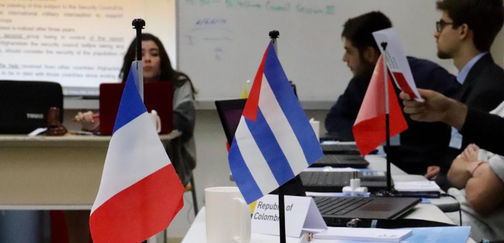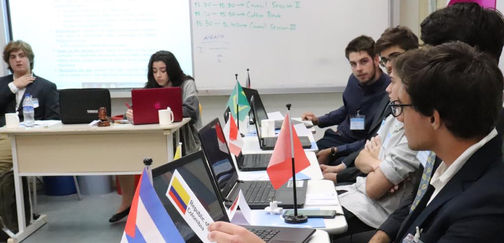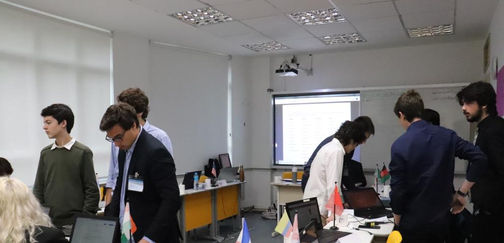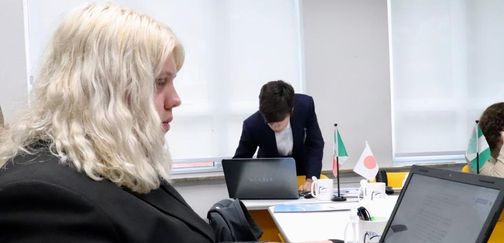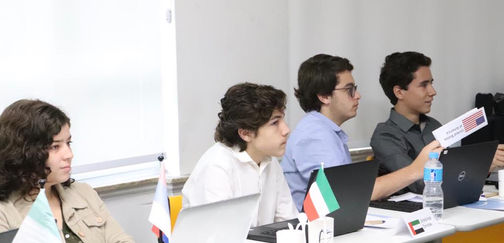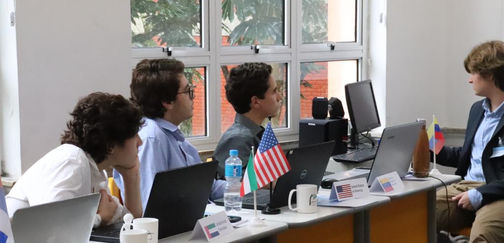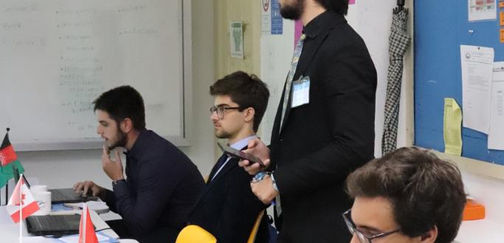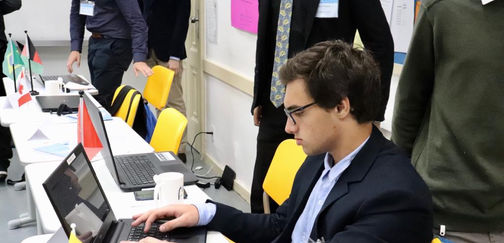Press Report
DAY 1
The Commission on Narcotic Drugs, composed by Canada, the Federal Republic of Nigeria, the Republic of Colombia, the Islamic Republic of Afghanistan, the Bolivarian Republic of Venezuela, the United States of America, the Federative Republic of Brazil, the French Republic, the Republic of Cuba, the United Mexican States, the United Arab Emirates, the aislamic Republic of Afghanistan, the State of Japan, the
Republic of India and the Russian Federation, and chaired by Sophie Cupello and Daniel Kligerman came together today to discuss a very important issue: the opioid crisis around the world. Opioids are drugs naturally found in opium poppy plants that act on opioid receptors and produce morphine-like effects (control pain and emotion, increase the dopamine production generate intense euphoria). These substances are often used in medications, mostly as painkillers; however, if used incorrectly and/or abused, its consumption can lead to serious health issues, like addiction, or even death. During the last few decades, the world has been dealing with what is known as the opioid crisis, characterized by an increasing number of fatal overdoses and illegal opium trafficking, which also is the main topic to be discussed in this committee. After presenting their opening speeches and positions on the matter, the delegates soon agreed that the opioid issue has to be tackled in separate subtopics: opium production and transportation, and the misuse of opium-based medication. Regarding the first subtopic, the situation of the Islamic Republic of Afghanistan revealed itself as a matter to be taken into consideration. The Islamic Republic of Afghanistan has the most opium poppy plantations in the world and is the main opium supplier to countries like the Russian Federation. However, the Afghan government does not have control over the illicit transactions and trafficking between the country and other nations, which is why the Afghan delegate soon appealed for help. The delegate’s request for aid was soon taken in by the People’s Republic of China and the United States of America, who offered various solutions to tackle the issue, besides the other delegations, who also engaged themselves to help.
Before the first council meeting was even over, the delegates gathered to formulate resolutions regarding the first discussed topic. The council then divided itself in two blocks who, although sharing the same views regarding the importance of fighting opioid trafficking, had different proposals on how the problem should be tackled.
The first resolution, sponsored by the United States of America, the People’s Republic of China and the Republic of India, amd submitted by the Islamic Republic of Afghanistan, the French Republic, the State of Japan, the Russian Federation and the Federative Republic of Brazil addresses the international trafficking of opium based drugs and proposes the creation of a supervisory global alliance (OFPTA - Opium Fiscalization of Plantation and Transportation Agency). It also recommends that the situation in Afghanistan regarding the Taliban and military intervention should be passed to the UNSC, declares that there will be more CND meetings about the topic, supports the improvement of investments in public services and encourages the creation of an international organization focussed on researching effective trestment alternatives. The resolution was approved by all members of the house, who applauded the success of the meeting’s first official document. Furthermore, another resolution was presented by Canada, the United Mexican States and the United Arab Emirates, alongside the Federal Republic of Nigeria, the Republic of Colombia, the Bolivarian Republic of Venezuela, the Republic of Cuba and the People’s Republic of China, with the group’s suggestions on how to end drug trafficking. This document, however, was not approved. During the next two council meetings the delegates directed their debate towards the topic of misuse of opium-based medication. During the discussion, other topics like corruption between doctors and medication suppliers and the distribution of painkillers were emphasized. Again, the delegates gathered in two blocks to write resolutions. The third resolution of the day, submitted by the Peoples Republic of China, the United Mexican States, the Republic of India and the State of Japan (and co-submitted by all other delegations except the United States of America and the Islamic Republic of Afghanistan) expresses concern about the increase of opioid consumption and multinational pharmaceutical companies who conduct aggressive marketing strategies to attract consumers and addresses mainly the corruption in the opium-based medication market. To solve the problem, the delegates strongly advise a better control of perscriptions, recommend the development if stricter laws to regulate pharmaceutical marketing and reinforce the importance of qualified medical staff. The resolution was approved and, once again, the council showed its effectiveness and concentration on the debate. The last resolution of the day, presented by the United States of America and the Islamic Republic of Afghanistan, had similar principles, but was not passed.
Throughout the whole day, during three council meetings, the delegates of the Commission on Narcotic Drugs clearly showed concerns about the topic and motivation to solve the opioid crisis. It was a very productive day, and the AAMC is more than honoured to have been given the opportunity to be there.
-Isabel Hamm
______________________________________________________________________
DAY 2
During the third council session of the day, the delegates found themselves faced with a critical situation: during a security operation run by the DEA and the US Special Forces, the United States of America detected a potential threat to the American people. The threat consisted of a drug deal operation led by the Sinaloa Cartel, one of the biggest drug desling organizations in the world. After identifying one of the facilities used for heroin and fentanyl production, the US Secretary of Defense, Mark Esper, and the US
president Donald Trump authorized the entry of American troops in Mexican territory to bust the operation. It is important to make clear, at this point, that the Mexican government was not warned, therefore didn’t authorize the operation. During the procedure, however, there was a cross fire which resulted in the killing of 16 Mexican outlaws. Despite the casualties, the American government still believes that the operation was successful and a necessary measure to ensure peace and security to Mexico and the United States, in contrast with the Mexican government, who is revolted and claims that the US’s actions interfere and harm the country’s sovereignty. The situation quickly led to an escalation in the debate. The council was visibly split in two divergent groups with opposite ideas. Mexico and its allies (China, Afghanistan, Russia, Cuba and Venezuela) condemn the United States for its actions a d claim that the country had absolutely no right to run a military operation in another country, especially without the authorization of this country’s government. During the intense discussion between the blocks, the US were described as undemocratic, aggressive, ignorant, but also predictable. On the other side of the table, the American delegate, alongside the United Arab Emirates, Japan, India, France, Colombia and Brazil, defends the position that it was a necessary operation, seeing that the drugs would be sold American and Mexican citizens and only harm the society. The tension rose even more when China threatened Japan with an invasion to kill terrorists in Japanese territory (as an example of the United States’ actions), or when the discussion deviated to the topics of corruption and incapable governments. The blocks haven’t formulated official documents yet, but the committee has already shown concern about the topic (on both sides of the situation) and urge to solve the problem.
-Isabel Hamm


